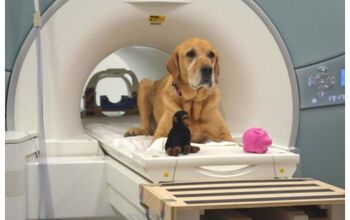Researchers at Virginia Tech May Have Hope For Brain Cancer Patients

Senator John McCain passed away last week, after battling Glioblastoma for the last year. Glioblastoma is a difficult to treat brain cancer, and the Senator died the day after his family reported they’d no longer seek medical care for the cancer.
Researchers at the Virginia-Maryland College of Veterinary Medicine at Virginia Tech in Blacksburg, Virginia hope that one day, their work with dogs who have Glioblastoma may lead to a treatment and cure for dogs and their human best friends too.
Glioblastoma is the deadliest form of brain cancer, and the researchers want to test an experimental canine treatment in dogs. Dogs with the disease are being enrolled in the clinical trial, in hopes to offer more treatment options and longer lifespans.
Related: Gene Therapy Promising For Neuromuscular Disease Treatment In Dogs and Humans
The researchers inject the drug directly into the tumor, and the hope is that the drug attacks the cells of the life-threatening cancer while it leaves the surrounding healthy brain tissue undamaged. Dr. John Rossmeisl is a professor of neurology and neurosurgery with the vet college and said that they watch what happens after they’ve injected the drug on an MRI. They have been able to watch the drug cover the entire tumor and can see that all cancer cells were targeted appropriately.
This is such exciting and hopeful news that the National Institutes of Health is also a financial sponsor of the trial, as they believe that the treatment could be a breakthrough for human Glioblastoma as well.
Early results of dogs enrolled in the program are promising as the scans show that tumors are shrinking and dying, and dogs are enjoying more time with fewer side effects from both the cancer and the treatment. The researchers are quick to note that while this is promising, the initial goal is to pan out whether or not the drug is an effective treatment for shrinking the tumors and extending life with better quality.
Related: New Antibody Gives Fresh Hope For Dog Cancer Treatment
That said, they hope that if that’s the case, they have high hopes it may present humans trying to fight this type of cancer with more options, and even one day, a cure.

More by Lori Ennis























